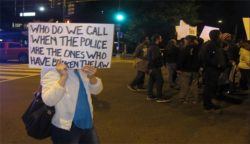Source of article The Jury Room - Keene Trial Consulting.
We mentioned this scale last week in a combination post but decided it deserved a post of its own as with other scales we’ve featured here in the past. You are likely aware of the terms “driving while black” or “flying while brown” and this scale means to document that experience of discrimination and accompanying health impact. Despite a plethora of research on general stress and race-related stress—the researchers developing this scale say they “are not aware of any psychometric instruments that specifically focus on assessing Black men’s experiences with law enforcement discrimination”.
In order to develop a valid scale, the researchers did “exploratory qualitative interviews” with 90 Black men from three towns in the state of Georgia (in the US). From those interviews, the researchers developed 8 “distinct dimensions” of negative experience with the police:
being accused of drug-related behavior, being unfairly pulled over while driving, being unfairly stopped and searched, being assumed a thief, experiencing verbal abuse, experiencing physical abuse, unfair treatment associated with attire, and being unfairly arrested.
Their next step was to develop scale items (i.e., questions) based in the 8 dimensions they identified through the 90 qualitative interviews. They tested the questions generated in a couple of focus groups by asking focus group members to consider the individual questions and to talk with the researchers about their thought processes as they answered the questions. They revised the questions following the focus group feedback and followed up a second time with individual interviews of another sample of 15 Black men. The researchers again sought feedback on question content and thoughts associated with the questions. They were then ready to pilot test 8 questions to a small group of 22 men.
They screened the men with the following “filter question”: “Have you had any experiences with police or law enforcement in the past year?” Thirteen of the 22 men responded “Yes” and they were asked to complete the questionnaire. After this phase of scale development, they changed the “filter question” time period from one year to 5 years to get a larger experience base to sample and dropped the overall scale length from the initial 8 questions to the following five questions.
In the past five years, how often have police or law enforcement…
- …accused you of having or selling drugs?
- …pulled you over for no reason while you were driving?
- …been verbally abusive to you?
- …been physically abusive to you?
- …treated you unfairly because of how you dress?
The final effort of scale validation used 1,264 Black men who ranged in age from 18 to 65 years with an average age of 43.99. Participants were recruited via a random-digit-dial method in four Georgia counties (Fulton, DeKalb, Lowndes, and Muskogee) located in three metropolitan areas (Atlanta, Columbus and Valdosta). Basically the interviewers called random numbers and asked if any Black males lived at the phone number. Those that did not hang up on them were asked if there was more than one Black male residing at the address and if yes, a single Black male at that phone number was selected for participation. Each Black male was asked all five questions on the PLE Scale.
Here is what they found:
Younger men had higher scores on all of the scale questions (including the filter question) when compared to older men.
Men with lower incomes scored higher on the scale questions and reported more accusations of drug abuse, more physical abuse, and more unfair treatment because of attire than men reporting higher incomes.
Men with less education reported more accusations of drug abuse, being pulled over, more unfair treatment due to attire, and more general experiences (in response to the filter question) compared to men with more education.
Men who had been in prison reported higher frequencies on all questions on the scale than did men who had no history of incarceration.
Higher scores on the scale were associated with more racial discrimination experiences and depressive symptoms.
The researchers believe this scale is culturally rooted in the experiences of Black men and can aid in describing the impact of police behaviors on Black men in a consistent way. From a litigation advocacy perspective, this scale may be used to help educate jurors on the day-to-day experiences of Black men as they encounter police and law enforcement officers.
English, D, Bowleg, L, del Rio-Gonzalez, M, Tschann, J Agans, RP Malebranche, DJ 2017. Measuring black men’s police-based discrimination experiences: Development and validation of the Police and Law Enforcement (PLE) Scale. Cultural Diversity and Ethnic Minority Psychology, 25(2), 185-199.
SaveSave


